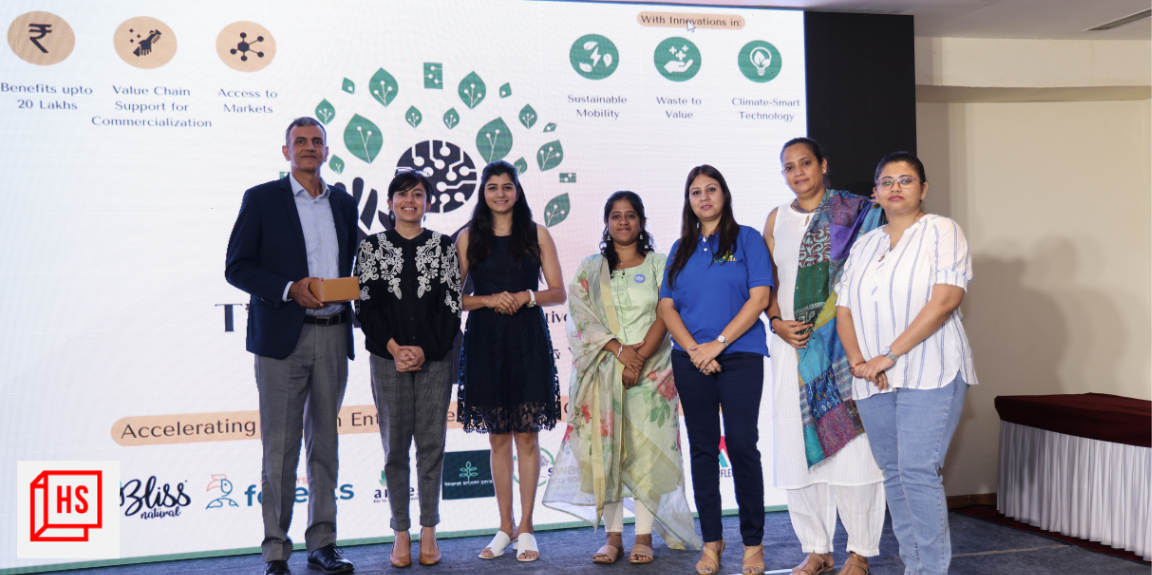Villgro and Cisco to support women-led startups in climate action
The TVARAN initiative, driven by a Villgro-Cisco partnership, aims to help seven women-led/co-founded startups in climate action through focused market entry and expansion plans.
Climate change affects everyone, but women often bear the brunt of it and are more vulnerable to its effects.
According to UN Women, women and girls experience the greatest impact of climate change, which amplifies existing gender inequalities and poses unique threats to their livelihood, health and safety.
However, to mitigate these challenges and manage climate change and its risks better, women are offering valuable insights and solutions—drawing upon their experiences as early adopters of many new agricultural techniques, first responders in crises, entrepreneurs of green energy, and decision-makers at home.
Building a sustainable future thus entails harnessing the knowledge, skills and leadership of women in climate action.
Women at the heart of climate action
In this context, , an incubator for social enterprises, and technology company Cisco, through its India Cash Grant Program, have jointly chosen seven women-led startups in the climate action space for a six-month targeted acceleration programme titled TVARAN.
This initiative aims to expand the market presence of women-led startups innovating in renewable energy, water and waste management, and climate-smart agriculture.
Speaking to HerStory, Jenaan Lilani Bhargava, Chief Operating Officcer, Villgro, elucidates the idea behind TVARAN and how women-led startups in climate action can benefit from it.
She begins by outlining the state of women’s entrepreneurship in the country and what women entrepreneurs actually want.
Bhargava says that, until a few decades ago, women growing up in business families were not encouraged to participate in business conversations or were not introduced in business meetings.
However, now it’s heartening to see a lot of attention in this space—with more grants, competitions, rewards and recognition, she says.
“But what is solely lacking is helping women entrepreneurs get a foot in the door, with access to markets, new customers, and helping them scale in new geographies.”
This is where TVARAN comes into play.

Jenaan Lilani Bhargava
Bhargava believes the right time of financing is more important than just raising funds. This means making sure women entrepreneurs are able to commercialise well and Villgro is able to walk the distance with them by converting conversations into deals.
TVARAN chose to direct its experience and energy towards working with women entrepreneurs in climate action, with the TVARAN Accelerator Program.
“Evidence suggests when there’s a higher participation of women in climate action-related initiatives, the outcomes are beneficial,” points out Bhargava.
“There’s also evidence to support that women are disproportionately and negatively affected by climate change. These two reasons led us to begun our work in a focused manner, with women-led solutions, particularly in climate action,” she says.
On the climate action front, Bhargava says women are offering solutions in conversion of waste to value, sustainable housing materials, green jobs, livelihood generating appliances based on decentralised renewable energy, sustainable mobility, and renewable energy.
TVARAN Accelerator Program
The accelerator programme has a few priorities—the startup should focus on climate action and it should have a readymade product. The programme is open to any woman-led or woman co-founded startup from any part of the country.
Applications for the programme opened for early-stage women entrepreneurs in October last year. Only startups in the climate action sector that are founded/co-founded by women with at least 50% shareholding and where women play an active role in decision-making were eligible for the programme.
The programme received 140 applications from across India, of which 11 startups were selected for a month of focussed go-to-market and scaling support—including four masterclasses on critical topics such as finance for scaling, business value of impact data, understanding customers through design thinking, and building strong pitches.
The 11 startups then pitched to a jury consisting of experts from Cisco, Villgro, and Bhartiya Yuva Shakti Trust.
The seven winners in the first cohort of the TVARAN programme are Climate Sense, Green Grahi, Green Delight, MOWO Fleet, Swachha Eco Solutions, KNP Arises Green Energy, and Bharat Krushi Seva.
These enterprises will undergo a six-month acceleration programme designed to finance and implement the go-to-market strategies of women entrepreneurs.

Left to right: Joginder Yadav (Director – Corporate Counsel Cisco India & SAARC), Krutika Ravishankar (Co-founder, ClimateSense), Shivali Sugand (Co-founder, GreenGrahi Solutions), Niveda Ravikumar (Co-founder, GreenDelight Innovations), Kirti Vaishnav (KNP Arises), Victoria D'Souza (Swachha Eco Solutions), Sharayu L - (CEO & Co-founder, Bharat Krushi Seva)
Villgro and Cisco will offer a financial support of Rs 1.4 crore (up to Rs 20 lakh—grant support of Rs 18 lakh and technical support of Rs 2 lakh—per startup). The startups will also be provided support in capacity building, business planning, mentorship, and peer learning—focused on the implementation of go-to-market strategies.
“At Villgro, we have designed a five-year strategy to find out where we can be catalytic,” says Bhargava.
“There’s a growing number early-stage funding and several networks meant specifically for women entrepreneurs to be able to support each other and for peer learning. Where progress hasn’t been made is in facilitating a business network that can support women-led businesses. We are changing that.”
Edited by Swetha Kannan










